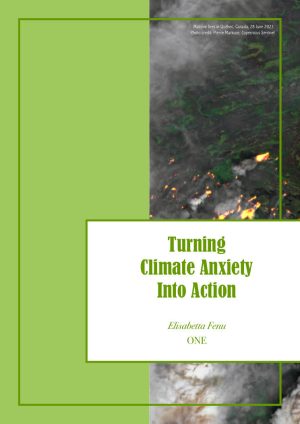 Adaptation keeps many species, including ours, alive and thriving. In nature, how fast and well you adapt decides your survival. Humans somehow thought they could bypass that. We thought we were no longer within nature and had tools to face whatever we couldn’t control.
Adaptation keeps many species, including ours, alive and thriving. In nature, how fast and well you adapt decides your survival. Humans somehow thought they could bypass that. We thought we were no longer within nature and had tools to face whatever we couldn’t control.
What a misconception. Not even climate deniers can deny how frequent extreme weather events have become nowadays. And that is just the tip of the iceberg of a process that is going too fast for us – and many other species – to adapt. Blood is on our hands.
Adaptation involves change, and it takes work. It also usually takes time, effort, and a relative amount of pain.
A few years ago, as a teenager, the impending doom of something that an individual couldn’t stop, or something that would eventually become our demise, felt crushing. All I felt was anxiety, hopelessness, and cynicism against a world fueled by greediness and whose priorities aren’t logical. So, I ran away from it.
Now I know there’s a word for it – climate anxiety. And it’s more common than I thought.
An outsider’s perspective
When climate change started becoming a pressing matter on many governments’ agendas, public opinion did what we do best: split into polarised factions, each sitting at opposite extremes. Either you were extremely concerned about climate change, or you were leading a crusade to convince everyone else that everything was fine, and it was all a facade to instill fear in the population. Then there was the third group: the bystanders, who did not deny but were intimidated by the new movement.
Either way, the population was fearful. And fear often does not translate into concrete action to address the problem. Indeed, a study on climate change anxiety titled “Development and validation of a measure of climate change anxiety” (Clayton and Karazsia) says that “climate change anxiety is not uncommon, especially among younger adults; worry can be differentiated from a more serious impact on one’s life; and climate change anxiety is correlated with emotional but not behavioural responses to climate change.”
I was probably more concerned than the average bystander, but at the same time, it all felt too overwhelming. Why would I have to go and protest for something I can’t change? Why do I have to transform my life radically or follow some new rules with great effort, whereas the biggest producers of GHG emissions do not care? Why would I be working on it, if the people who mattered didn’t care? It was easy to assume that any individual effort would prove futile and didn’t really matter.
It was easier not to believe in a better future. It’s already too late, I thought.
See with your own eyes
I’ve always been a scientist at heart. Since I was a child, that’s who I was: curious, explorer, rational. An insatiable hunger to know what reality is made of and how it works.
Though my studies differed, in a strange twist of fate, I ended up in a Research Centre for the development of clean energy technology.
All this time, I’ve thought I’m back where I belong. How lucky I am that I can work for something that is changing the world instead of adding fuel to the fire of environmental destruction. Not everyone has this privilege. But this also meant I had to face my protection mechanism of thinking that our destiny is already written, and we can’t do anything to change it. It wouldn’t be fair for myself and everyone else to work in such a place and not put all our effort and resources into it. How can I put my heart into something and not believe in it? That’s when I woke up.
Despite the pessimism and hopelessness, change was happening in front of my eyes. Suddenly, every day, I found myself surrounded by people committed to shifting our dire projections.
It’s not that the protests weren’t enough for me to act, or all the activism fell short. For the first time I didn’t hold myself up to standards of perfect sustainability or some moral pedestal I knew I couldn’t get up on. This isn’t about morality or following a strict, ideal lifestyle like fake influencers or climate deniers want you to think. It’s about doing your best.
It’s not fair to say that climate activism wanted to create a movement of moral superiority or that climate alarmism wanted to spread anxiety. However, it’s important to consider that humanity is multifaceted, and you cannot solve such a wide, urgent issue with one technique alone. Eventually, you’re going to face resistance and get different reactions at different levels of education. Everyone has to feel included.
Modern climate activism is doing a great job of adjusting itself and conveying this concept so that future generations won’t have to feel like I did when I was lost and younger.
Protests and continuous activism are the backbone of the climate change movement, and they’re a pivotal way to get the attention of thousands of people. Urgency must be conveyed with accurately explained scientific data and dissemination, not with social media posts aimed at making the reader feel doomed. Instead, we have to promote the culture of environmental education and how to act on it. We must focus that urgency on new policies and not let climate deniers exacerbate the polarisation of public opinion.
Together
Most climate activists agree that it all comes down to one simple, natural concept: community.
The key is to act together. Climate activism does not belong to an elite, nor does anyone do it “better” than the other. The cognitive distortion of all-or-nothing thinking is widespread, and it prevents people from trying to do something small that matters when added to all the small actions of a community.
If you want to join the protests, go. If you can’t, don’t beat yourself up. Doing what you can do daily will be just as effective.
The community of a Research Centre is peculiar. Sharing a common goal for the sake of our planet gave me the courage to believe in a different future. Our destiny is not set in stone, and now I know we can succeed because I experience it every day.
The world is filled with people who care more than I’ve ever thought, and that is enough for me to know it’s worth trying.
The core of Only Natural Energy is to reiterate that we are not outside of nature, we are nature. And we must follow this path if we want to live harmoniously with our surroundings. We can’t forget where we come from.
Believing in a different future can be one of the most painful experiences.
Amazingly, they can turn out to be the most positive and rewarding. If it happened to me, it can happen to you too.
Elisabetta Fenu




